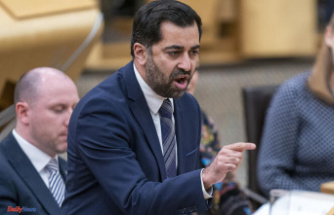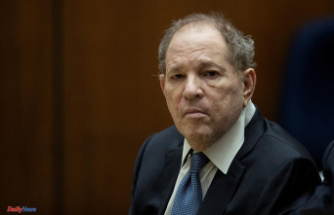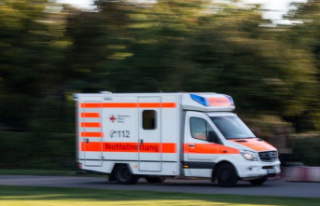Martin Lewicki traveled the world for two and a half years, with a rucksack and as frugally as possible. Every two weeks he reported to WELT about his experiences and adventures in the "One Way Ticket" column. Now he has returned to Berlin – because of love. Time for a balance sheet.
WORLD: You started your trip around the world at the end of December 2019, just as Corona broke out, and went through it for two and a half years. Why?
Martin Lewicki: This trip was my big dream. And I just didn't want to give up that dream. Corona made everything complicated and unpredictable, but I still enjoyed every day and loved being in new places again and again.
WORLD: How many countries have you seen, how many kilometers have you traveled in total?
Lewicki: There have been exactly 20 countries, despite the corona restrictions. In most countries I was four to six weeks. In Thailand even half a year because of the hard lockdown in 2020. And in Colombia and Argentina it was almost three months each. I actually calculated the distance covered: it was more than 123,000 kilometers in total, i.e. a good three times around the world.
WORLD: What was your motive for the world trip?
Lewicki: First and foremost, curiosity about unfamiliar countries and cultures. I was hungry for adventure and new experiences. Instead of watching the travel reports on TV, I wanted to experience them myself. In addition, I had had enough of my everyday life in Berlin at the time. I wanted to break out of years of routine and lead a completely different life.
WORLD: Did that work?
Lewicki: Absolutely! From today to tomorrow my life has changed completely. And that almost every day anew.
WORLD: How do you finance a trip around the world?
Lewicki: Many travelers I met had saved at least a year or two before going on a world tour. Then they traveled until the money ran out. For me that wasn't an option.
When I was in my 40s, I didn't want to blow my life savings. So I decided to finance the trip completely on the way. I became the so-called digital nomad. I continued to work as a journalist, just not in Berlin offices, but from anywhere in the world where I had internet and electricity.
WORLD: Did the trip around the world go as you had planned before Corona?
Lewicki: (laughs) Of course not. My first stops in India, Nepal and Myanmar went according to plan. But when the global lockdown set in, I only had two options: sit out the situation in Thailand or cancel everything and return to Germany.
I'm glad I chose Thailand back then, even though everyone - including my family and the federal government - advised against it. It was probably one of the few rebellious moments in my life. So I was able to stay in Asia and continue the journey later, albeit under difficult conditions.
WORLD: You were traveling in Asia, Europe, Latin America. How do you deal with the virus in these parts of the world?
Lewicki: I've noticed that in some countries people stick to rules more closely and don't question authorities. In Thailand, for example, wearing the mask was strictly adhered to for a long time. In Peru you still have to wear a face mask on the street - in closed rooms even two surgical masks on top of each other or an FFP2 mask.
I believe that in many countries the lack of knowledge among the population is much greater than in Germany. There you are either too anxious or too relaxed with the virus. Personally, I prefer a middle ground: not ignorant, but not panicking either.
WORLD: Did you always and everywhere adhere to the mask requirement on site?
Lewicki: I've always tried to respect a country's corona rules, even if they sometimes seemed absurd to me. After all, I entered the country as a guest. But if I had to wear a mask on the open road or on a hiking trail in the great outdoors, I had a hard time.
WORLD: How many masks have you worn out in the two and a half years?
Lewicki: I didn't keep any statistics on that (laughs). To be honest, I rarely changed the masks, there was already enough rubbish everywhere. Probably three or four a month.
WORLD: What do you do on a trip around the world if you have a cough or a cold?
Lewicki: At moments like this I could use the quick tests that I had with me or that friends from Germany brought me with them when I met them somewhere along the way. If the test was positive, I immediately took single accommodation and isolated myself there until the test was negative.
But I've also seen travelers coughing and sniffling in Mexico strutting through hostels without a mask. That was too much even for me. Once I had to ask a woman to at least wear a face mask if she was clearly coughing and sneezing next to me.
WORLD: How often did you have Corona on the way?
Lewicki: Twice – once in Colombia and once in Mexico. The symptoms were mild, but isolating was complicated. In addition, I almost had to cancel my onward flight because of Corona in Mexico. Luckily, my PCR test came back negative the day before departure.
WORLD: Corona is not over and is on the rise again in many countries. Do you travel differently today than at the beginning of the pandemic?
Lewicki: In 2020, traveling was impossible for months. Now it is possible, but often still complicated. Unlike in Germany, where there are currently almost no restrictions, strict rules still apply in many countries. As a traveler, you should therefore continue to find out about the virus situation and the entry rules in the destination country. And about what documents you need for the trip. This is partly crazy bureaucratic, completely different than in Europe.
WORLD: Where, for example?
Lewicki: Not long ago I had to present a stack of papers when entering Bolivia: travel health insurance, notice of a PCR test, registration with the health authorities and printed vaccination certificates. That's annoying.
WORLD: Let's leave the virus aside. In which region, in which country do you travel most relaxed?
Lewicki: That depends on what you consider to be relaxed. I found my car tour through Montenegro very relaxed. My motorcycle tour through northern Thailand was also fairly stress-free, despite the rainy season. I also found Argentina to be a very relaxed country to travel to. You just don't get stressed there.
WORLD: Which countries would you recommend for imitators?
Lewicki: Georgia, Bolivia and Ecuador fascinated me. They may not be the most relaxed of countries, but the natural diversity and landscapes are breathtaking. And tourism is still limited there. Actually, I would have liked to recommend Myanmar as well. Unfortunately, since last year, the military takeover has made traveling there almost impossible.
WORLD: And where is traveling complicated and stressful?
Lewicki: I found India and Nepal exhausting. The confrontation with poverty, extreme temperatures and pollution are really challenging - and the constant noise in the cities there! On the other hand, these countries have a lot to offer and are definitely worth a trip despite the stress.
WORLD: As a backpacking white person, are you welcomed everywhere?
Lewicki: I didn't encounter any rejection anywhere. Except when Corona broke out - I was in Thailand at the time and was regarded and avoided by the locals as a dangerous virus slingshot for a few weeks. But I understand their fear at the time. But it soon became clear that being a foreigner is not automatically contagious. The Thais were all the more happy about the few foreign travelers who left at least some money in the country.
WORLD: What was the worst experience on the trip?
Lewicki: When I was relieved of about 1,500 euros on a bus in Ecuador: My laptop and cash were stolen from my backpack quite tricky and unnoticed by me.
I felt even more traumatic when I slipped down a snowy mountain slope in the Himalayas at over 5,000 meters and in complete darkness. Luckily other travelers helped me. Ever since then, I've had a hell of a lot of respect for mountain hiking.
WORLD: And what was your best experience?
Lewicki: Difficult to pick a single experience, there were simply too many unique and unforgettable moments. But my ten-day silent seminar in southern India was certainly one of the most intense and valuable experiences for me.
WORLD: You met many travelers from various countries on the way. Do Germans travel differently than other nations?
Lewicki: I can only report on backpackers, I have hardly met any others. The Germans are mostly very well equipped and excellently informed. Everything is thought through and planned before the trip. In Colombia, for example, people thought it was funny that, as a German, I always had a rain jacket with me. There was a brief but heavy downpour every day. Most Colombians, on the other hand, had neither jackets nor umbrellas and preferred to wait for the rain to stop – or get soaked.
WORLD: To whom would you recommend a trip around the world?
Lewicki: I think a trip around the world is ideal for young people, preferably after they have graduated from high school or studied. You gain a completely new world view, get to know cultural diversity and different ways of life. This makes you question yourself, your own values and goals. But even if you – like me – have lived in an everyday routine for too long, life gets a new kick from a trip around the world.
WORLD: Is there a kind of age limit for world travel?
Lewicki: No. It's really just a matter of the mind whether you feel too old for it. But as a young person under 30, you are physically better able to cope with time differences, differences in altitude, noise levels and extreme temperatures.
WORLD: How many kilos of luggage can you get by with? Did you have anything superfluous with you that you didn't need in the end?
Lewicki: At the beginning I had about 20 kilos with me. It ended up being closer to 15. Over time I shed ballast. I sold my camera equipment because it's easier to have a smartphone at hand. That alone saved a good two kilograms. I gave up a pair of shoes, a pair of trousers and two sweaters. I never needed the cycling shorts – and luckily I didn't need the malaria medication either.
WORLD: What did the trip around the world teach you the most?
Lewicki: Definitely modesty and gratitude. I faced a lot of poverty on the trip. In many of the countries I have visited, people are struggling to survive every day. They only live on what they earn during the day. For them, there is no such thing as savings, old-age provision, a social network or a healthcare system. What we have here in Germany are fantastic conditions in a global comparison, even in the current difficult situation.
WORLD: You were on the road for two and a half years, but haven't seen many countries yet. Will there be a world tour sequel?
Lewicki: At the moment I'm enjoying not having to look for the next place to stay every few days. But it's best to ask me again when Japan, Taiwan and China can be easily traveled to again. I could relapse there.
Read here what the author has experienced so far on his trip around the world.
After the ground staff strike, Lufthansa is back to normal operations. But the next strike is already looming, this time by the pilots' union. What to do if the flight is cancelled? "If no replacement flight is provided, you can remedy the situation yourself," says Kay Rodegra, a lawyer specializing in travel law.
Source: WORLD












